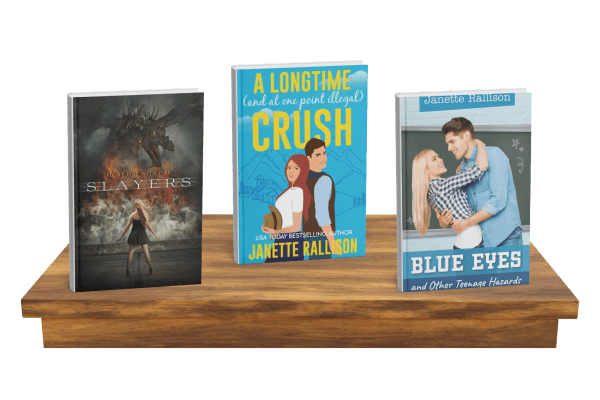As you may remember from your high school English class (you kept all of your notes on A Midsummer Night’s Dream, didn’t you?) Shakespeare invented around 1700 words in his plays and poems.
Frankly, I think I should be allowed the same freedom, and I get all snitty when copyeditors point out details like “Apexed isn’t a verb.” (And right now Microsoft is insisting that ‘snitty’ isn’t a word either.)
Shakespeare never had to deal with such constraints.
Here are some words you probably didn’t know he invented: eyeballs, puking, obscene, and skim milk.
Cool, huh?
Here are some words I wish he would have invented:
Another word for ‘drop’. Oh sure, there’s plunge and plummet, but you can’t use them interchangeably. You can’t have a character plunge her car keys on the floor. No one has ever said, “Hey, plummet the act. I know you’re lying.” Nor has anyone’s mouth ever plunged open.
Another word for ‘door.’ We use them all the time. Character’s are constantly coming in them, stalking out them, walking toward them, and slamming them. It’s hard not to overuse the word. And don’t tell me I could use portal—no one actually thinks of a door as a portal unless they are in spaceship or a submarine.
And Shakespeare should have invented multiple words for ‘turn’. In your novel, things will turn colors, turn up, or turn from one thing into another. Your characters will take turns, make right turns, turn over, turn back, turn their attention to things, see how something turns out, and turn things down. They will also frequently turn to each other. You can replace a few of those turns with spin, but that only works if your characters are angry or ballerinas. If any word deserves a few synonyms, it’s turn.
On the other hand, there are also words I could happily axe from the English language to make my life easier. Ask me how many times I mistyped the word rifle in Slayers: Friends and Traitors and spelled it riffle. The problem is that riffle is a real word. Spell check doesn’t catch it. It means: to form, flow over, or move in riffles.
How many times have we all written about our riffling habits?
Maybe someone should add a function to the computer so that anytime someone grabs a riffle, a little warning pops up that says, “You amuse our computer brain, silly mortal. And by the way, you have lightening cuting through the sky while your character is waking to the car.
Then again, sometimes I could use a good lightening bolt.
8 comments
Leave a comment
Stay In The Loop
Subscribe and receive 3 free Ebooks!
Want to know about new releases or ebook sales?
Sign up for Janette's newsletter and receive a free copy of 3 books:
- Slayers
- A Longtime (and at one point illegal) Crush
- Blue Eyes and Other Teenage Hazards



I need another phrase for eye rolling. I’ve noticed my characters do that a lot. Or grin. Sure you can smile in various ways, but grin implies something more conniving, and the other types of smiles just don’t cut it.
Agh! So true! Shakespeare was awesome in ways I didn’t even know 😛 Thanks for the word puke Mr. Shakespeare… All of those that you mentioned and more…I need more ways to say every word because I keep wanting to say “it” but I don’t want to and then I can’t find another word and Wah! 😛 By the way, you crack me up!
I’m about to have a geek moment here. Bear with me.
There’s actually a function in Word called an “exclude dictionary.” You can tell it to consider certain words an incorrect spelling. For example, I once worked at a place that dealt with a lot of “causal” issues. But it was so easy to mistype it as “casual” (very different!). So I added “casual” to my exclude dictionary and it was marked in red anytime I used it. At the same place, we used the word “public” a lot. You can probably guess that it would have been incredibly embarrassing to leave out the “l.” Hello, exclude dictionary!
Really, who needs “riffle” anyway?
I’ve heard of some fantasy writers breaking spell check when they have King Ingoiwe and Haveog journeying to Mount Voinlihgaxj on for too long. Take that, modern technology!
How dramatic would it be for one’s jaw to plunge? Or plummet for that matter? I think we should start using it and see what happens…
I had no idea about the exclude dictionary function. That sounds very helpful!
Tiana, ditto.
Sierra, It makes you wonder how Shakespeare came up with some words, doesn’t it? And I’m glad I crack you up.
Jenna-thank you so much for letting me know about this. I’m totally going to have to use it. Staid will be another word I’ll exclued. I’m always using it when I actually mean stayed.
Eliza, my spell check has an add to dictionary button–but unfortunately, sometimes I’m too quick to add, and then realize I’ve added a mispelled version of someone’s name. Oy!
Rantgirl, I wonder if my editors would let me get away with plunging jaws. (Sounds like a shark movie, doesn’t it?)
Jessie, I know, right? See how educational this blog is?
Fantastic post. I do write fantasy so my character names are never considered as nouns by Word. Try convincing the grammer checker that Stump is a character.